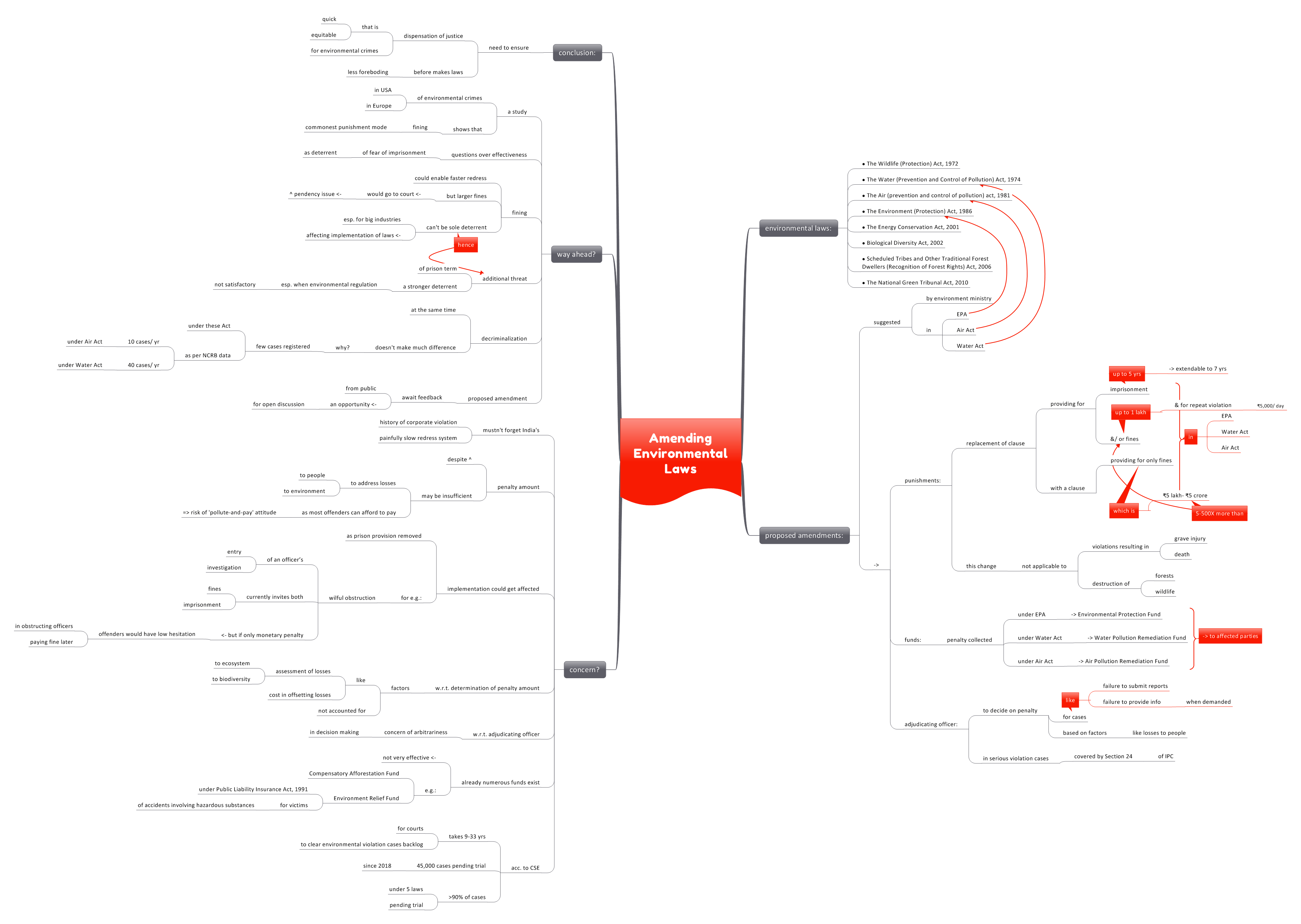Amending Environmental Laws

This topic of “Amending Environmental Laws” is important from the perspective of the UPSC IAS Examination, which falls under General Studies Portion.
Environmental Laws in India:
India has several key legislations in place to prevent unsustainable exploitation of our natural resources:
- The Wildlife (Protection) Act, 1972
- The Water (Prevention and Control of Pollution) Act, 1974
- The Air (prevention and control of pollution) act, 1981
- The Environment (Protection) Act, 1986
- The Energy Conservation Act, 2001
- Biological Diversity Act, 2002
- Scheduled Tribes and Other Traditional Forest Dwellers (Recognition of Forest Rights) Act, 2006
- The National Green Tribunal Act, 2010
What are the proposed amendments?
Recently, the environment ministry proposed amendments to the Environment Protection Act, the Water Act and the Air Act.
Punishments:
- Replacement of a punitive clause in EPA that provides for imprisonment of violators with a clause that provides only for the imposition of a fine. This fine is 5-500 times more than those that are currently imposed i.e. ₹5 lakh to ₹5 crore.
- However, this change isn’t applicable to violations that result in grave injury or death. It isn’t applicable to destruction of forests and wildlife either.
- The Ministry also proposed a similar removal of prison terms from the Air Act and the Water Act.
- Currently, the EPA provides for a prison term of up to 5 years or a fine of up to ₹1 lakh or both.
- For repeated violations, additional fines of up to ₹5,000/ day would be levied for each day of failure (post-conviction).
- The Act also provides for extension of jail terms to 7 years.
Funds:
- The funds, from the penalty collection under EPA, would be accrued into an ‘Environmental Protection Fund’.
- Similarly, penalties under Water Act would accrue into ‘Water Pollution Remediation Fund’ and those under the Air Act would go into ‘Air Pollution Remediation Fund’.
- The government would then disburse the funds to the affected parties.
Adjudication Officer:
- The proposal calls for the appointment of an adjudicating officer to decide on the penalty for cases like failure to submit reports and failure to provide information when demanded.
- The penalty amount is to be decided based on factors like losses caused to the people.
- In case of serious violations, the case shall be covered by the provisions of IPC read with Section 24 of EPA.
What are the concerns?
- India’s long history of corporate violation and painfully slow redress system mustn’t be forgotten.
- The penalty amount, despite the increase, may not be sufficient to address the losses to the environment and the people. Most offenders can afford to pay these penalties, risking a ‘pollute-and-pay’ attitude.
- With the imprisonment provision removed, the Acts’ implementation could get affected. For instance, wilful obstruction of an officer’s entry/ investigation is an offence that currently invites fines and imprisonment. If the penalty were simply monetary, offenders would have lower hesitation in obstructing officers and then paying the fine later.
- When it comes to the determination of the penalty amount, factors like assessment of losses to the ecosystem and biodiversity and cost in offsetting such losses, aren’t taken into account.
- There is also concern that there would be arbitrariness on the part of adjudicating officer, in their decision making.
- There are already numerous funds and they aren’t very effective. Eg: Compensatory Afforestation Fund (CAF) and Environment Relief Fund (ERF), under the Public Liability Insurance Act, 1991, for victims of accidents involving hazardous substances.
- According to Centre for Science and Environment, it took between 9 and 33 years for the courts to clear the backlog of environmental violation cases. Since, 2018, nearly 45,000 cases were awaiting trial. Over 90% of the cases were pending trial under 5 out the 7 environmental laws.
What is the way ahead?
- A study of environmental crimes in the USA and Europe indicate that fining is the commonest mode of punishment. Also, the question of whether the fear of imprisonment has acted as an effective deterrent has a long history- with proponents and opponents.
- Fines could potentially enable faster redress. However, cases involving larger fines would continue to be taken to court- adding to the already bulging caseload sitting with the judiciary.
- Monetary penalties alone cannot be a deterrent for the big industries and this would affect the Acts’ implementation. The additional threat of a prison term is a stronger deterrent– especially when the effectiveness of environmental regulation is not satisfactory.
- At the same time, decriminalization doesn’t make much difference as not many criminal cases are filed under these Acts. According to NCRB data, just 10 cases are filed under the Air Act and 40 under the Water Act, in a year.
- The proposed amendments await feedback from the public- providing an opportunity for open discussion.
Conclusion:
The government needs to ensure quick and equitable dispensation of justice for environmental crimes before making the laws less foreboding.


